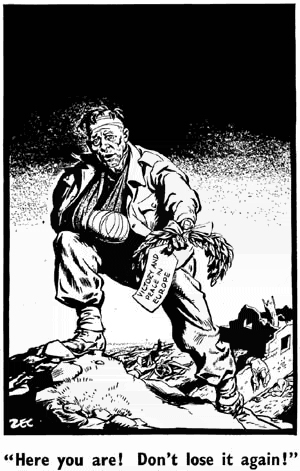Staff RoomIntroductionIn this section you can hear from some of the tutors listed on our News and Information page, who describe the work they do and the beneficial effects they've seen it produce in a range of educational areas. This is to illustrate some of the uses cartoon workshops can be put to for those who may be interested in applying them in some form but who need information about how they can work. Endorsements from the organizations some of these tutors have worked for will soon be added, confirming the value of the skills and techniques they've employed. Also added to this section will be links to any sites and resources similar to ours which are involved in promoting the use of sequential art and cartooning for general education. Further information on the tutors featured in this section, including contact details, can be found via their websites. They can also be contacted via our Search facility. Steve Marchant - the initiator of this website - can also be reached via the Cartoon Museum.
Firstly, my experience shows me that children - in fact, everybody - is fascinated by watching a cartoonist at work. Cartoons often show things in an exaggerated way, which is a great way of memorising facts. For example a large Henry the Eighth eating eight pies. Improving ones memory is taught by creating crazy, unlikely pictures in your minds eye. So by actually drawing these pictures in front of the children, this works the same way. Especially if you get the children to come up with their own suggestions. Cartoons are normally associated with drawing something funny, so that too helps the child remember. We all like to laugh and make others laugh, so what better way to learn. Also, with a few guidelines, its quite easy for children to draw their own simple cartoon characters, and it's easy for the child to remember something they have drawn themselves, using simple cartoon characters and situations. Comics are drawn in strip style, like the story board instructions for a movie. So any instructions can be detailed in the same way, a simple drawing for each stage. Comics don’t always have to be humorous. The more serious, dramatic Graphic Novel is becoming very popular. I have illustrated several books for children with reading difficulties. These have been drawn in a Graphic Novel/Comic Strip style. Using a few speech bubbles. This way they start to achieve the satisfaction of reading without being hit by pages and pages of text. From my own point of view, its just wonderful drawing for children and making them laugh. Ron Tiner MA This is for grown-ups who want to get into comics. I have worked as a narrative illustrator for 40 years and the tuition I offer is for adults who wish to become professional practitioners in comics and graphic novels. I was responsible in the late 1990’s for constructing a course at Swindon College of Art leading to a BA degree in sequential illustration from Bath University. The tuition I offer is aimed at helping students to get into practice as professional comics artists, by honing their drawing skills, and by examining the elements of visual storytelling - the specialist techniques exemplified by the work of leading comics artists and film-makers. My students gain, through practical assignements and critical study of published works, an understanding of plot, characterisation and narrative drive, the importance of viewpoint - how and where to use such devices as close-up shots and longshots, up- and down-shots - and all the other specialised illustration techniques used in modern picture narratives such as comics, manga and graphic novels.
When we run workshops in schools and libraries, teachers and librarians are always amazed at just how absorbed the children become in them, and how much interest is generated by them. Comics and graphic novels can be used to ease the path to books for reluctant readers and provide opportunities for discussion about literature, art, film making and even music composition, as the workshop participants are given an access into the creative process and invited to discuss the methods and ideas involved.
I've been involved in delivering comic workshops in schools, pupil referral units and special schools and libraries for over 10 years. Some of the feedback I've received includes : " He never sits for more that 30 minutes doing anything, but he's worked for an hour with you" ; " You've opened their eyes to new opportunities, that drawing can be something they can make a living out of "
I've found visual narrative skills come very naturally to children - they don't have to struggle to create with them as they might with other areas of learning. Comics give them the opportunity to express themselves in a way that many children might not be able to through other means. They also encourage children who find difficulty in writing or drawing to develop confidence and be creative - and this extends into their regular schoolwork. Letter of thanks re workshop staged at a young offenders institution : From: Chris Johnston Hi John, That was great, very well done. You had a good connection with the lads and kept them engaged for the full time. Some of them even produced some good drawings! Hopefully we can work out something else in the future. all best Chris From Sandra Hall – Friction Arts. We are a participatory arts company with an international reputation and we are deeply committed to making authentic and meaningful work with a range of different people and community groups. We have worked with John McCrea on several occasions as both an artist and workshop facilitator with young people with special needs. He has an extraordinary way of working, bringing skills, enjoyment and focus to the people he shares workshop time with. He has a very flexible style that suits the needs of different groups; creates a great rapport with both staff and young people and is always seeking to improve and refine the work that he makes with them. Not only does he possess these skills with a humility and great understanding; he is an extraordinary international artist with a great industry reputation and body of work. I have no hesitation in recommending John in a range of capacities and we here at Friction Arts look forward to continuing to work with him at every appropriate opportunity. Sandra Hall, Co-Director, Friction Arts. Love the Cartoon Classroom site by the way – it's an excellent idea and well presented, easy to navigate and a great platform for artists... excellent read.
I've found comic strips can get results from kids who usually struggle with writing. It's the nature of comics/manga itself that liberates the pupils' ability to story-tell in an inventive and immediate way. Having spoken at a number of Boys Writing events ( Wiltshire, Swindon and Nottingham ) I've found academics reaching the same conclusions. There's a high proportion of boys who seem to be visually-oriented - who find reading and producing comics to be easier, or more natural for them, than working with words alone. I often quote an example from my own school days. I had the best Reading Age in my primary school class because, from the age of 5, I'd been reading Marvel Comics. I wasn’t daunted by seeing long words like " thermonuclear ", because it was in a voice bubble coming from the mouth of Thor, or the Incredible Hulk, in a story I had no difficulty following because I was "reading" the pictures - being guided through them into understanding the meaning of the word.  The voice bubble is a unique educational device that is ignored far too much because of our culture's misunderstanding of, and snobbery about, comics.
I've found that comic workshops improve confidence in children who have issues communicating creatively, particularly those with literacy problems. They can express themselves more easily with words and pictures. And children who lack confidence in ordinary drawing find comic workshops rewarding experiences that enable them to get their ideas across in a clear manner. They're also useful in helping children who are reluctant to take up demanding studies, because creating comics is a demanding task. The completion of a long comic project makes them proud of what they've achieved. Comics can also assist in teaching, as a tool for tackling study subjects that may be difficult to focus on through traditional means. In a project on World War 2, I found the use of comics encouraged students to think about how people felt, how they lived, what they wore, etc.   I also teach in museums, and find comics work helps students think more deeply about the artifacts they've seen and the cultures they need to read about, encouraging them to really visualise descriptions of characters from texts. 
James Parsons
Crazy Comic Club - www.crazycomicclub.co.uk - workshops are run in schools, libraries and events across the UK, and are designed to be fun and educational, developing art and storytelling skills in children and teenagers, and helping to improve literacy. Getting more than twenty 15-year-old boys into a library and actively engaged with the literature on offer is, according to the libraries I've worked in, no mean feat.
"The workshops are a great way of engaging with young people, particularly teenagers, who wouldn’t necessarily come into the library otherwise. They appeal to kids of all abilities and interests and James is brilliant at encouraging participants to be as creative as possible. The workshops help young people who already have confidence in drawing and story-writing to develop their ideas but also make it easy for kids who don’t see themselves as talented or creative to produce brilliant pieces of work. The impact this has on the confidence of the participants is clear, and young people have reported feeling more positive about themselves and their abilities after the workshops. "
Lucy Gill - West Sussex Libraries
I've run comic workshops for schools, libraries and charities, which are Comic workshops can also engage the attention of disruptive or difficult pupils - and, for some, it can be the spark which ignites an interest in reading and drawing.  
Hi Vicky – I just wanted to say how brilliant the Summer Manga/Comic book drawing workshops were with the children at Dingwall library.  This was the best and probably most appropriate to libraries programme we have had in the library and it was interesting that it attracted boys as well as girls which is unusual.  We have had mostly very positive feedback form the children and we have the added bonus that they have been back to use the other library services having been made welcome here.  So thank you your time/preparation and delivery and I hope we will be in a position to ask you to come back to work with the children again next summer. 
For 20 years, as well as producing cartoons, comic-strips, and two books, for a host of clients, I've been visiting schools, libraries and other establishments to teach people of all ages and levels of ability how to write and draw their own comics. I'm assured that the outcomes of my students' work fulfil several 'key stages' of the curriculum - by clients and by the Cartoon Museum, where I do a lot of my teaching. The rest of my work with young people takes place in mostly one-off visits, but sometimes as a series of sessions. In 2006 and 2007, the British Council sent me to talk to teachers and librarians in Hungary and Latvia about my work with a view to them setting up their own cartoon and comics workshops for young people; I also taught at a few schools while I was there. Most young people like cartoons, whether on television, the cinema, or as the graphic component of computer games ; and in comics, graphic novels, manga - call them what you will. Where comics greatly differ from other forms of visual entertainment is that they require greater mental engagement, you can't just 'switch off' and be entertained, you have to be actively reading and thinking, using your imagination to bridge the gaps in what is shown from panel to panel. I'm often told by teachers that the group I'm to visit are kids that are reluctant readers and writers with low confidence in literacy skills. I’ve found that whilst asking them to produce an essay or a piece of creative writing poses a daunting challenge, getting them to write and draw a page of comics – whether it’s about themselves, a lesson subject, or just something fantastic or funny – gives them a very evident sense of pride and accomplishment, especially if their work is then put on display or printed/photocopied as a comic book. Comics can be used to reflect, reinforce and complement learning achieved in other lessons, such as history, citizenship, literacy, literature, etc, allowing students to apply their knowledge in a purposeful manner.
"A picture paints a thousand words" is certainly the case where cartoons are concerned. People have an ingrained affection for cartoons and will let their guard down when viewing a cartoon image, opening themselves up to messages that might otherwise fail to reach them.
|
||
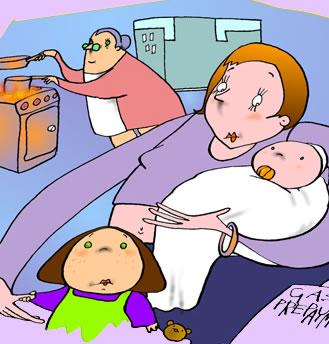
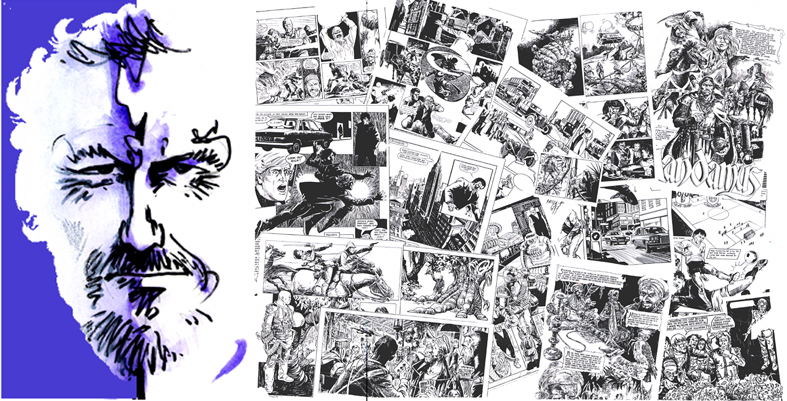
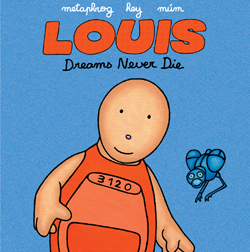
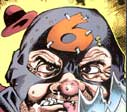 John McCrea
John McCrea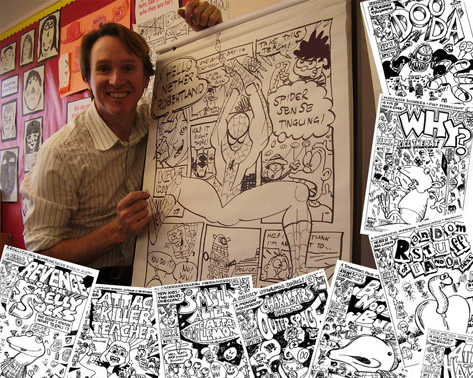
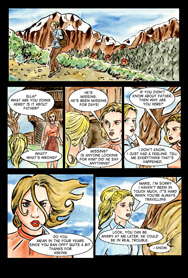 Leonie O'Moore
Leonie O'Moore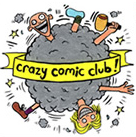
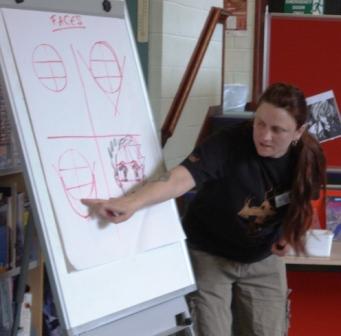
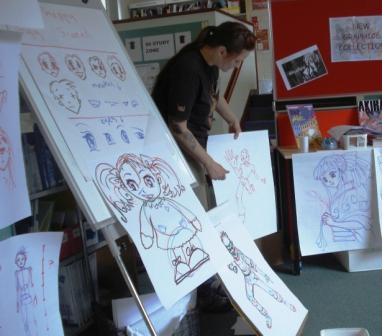
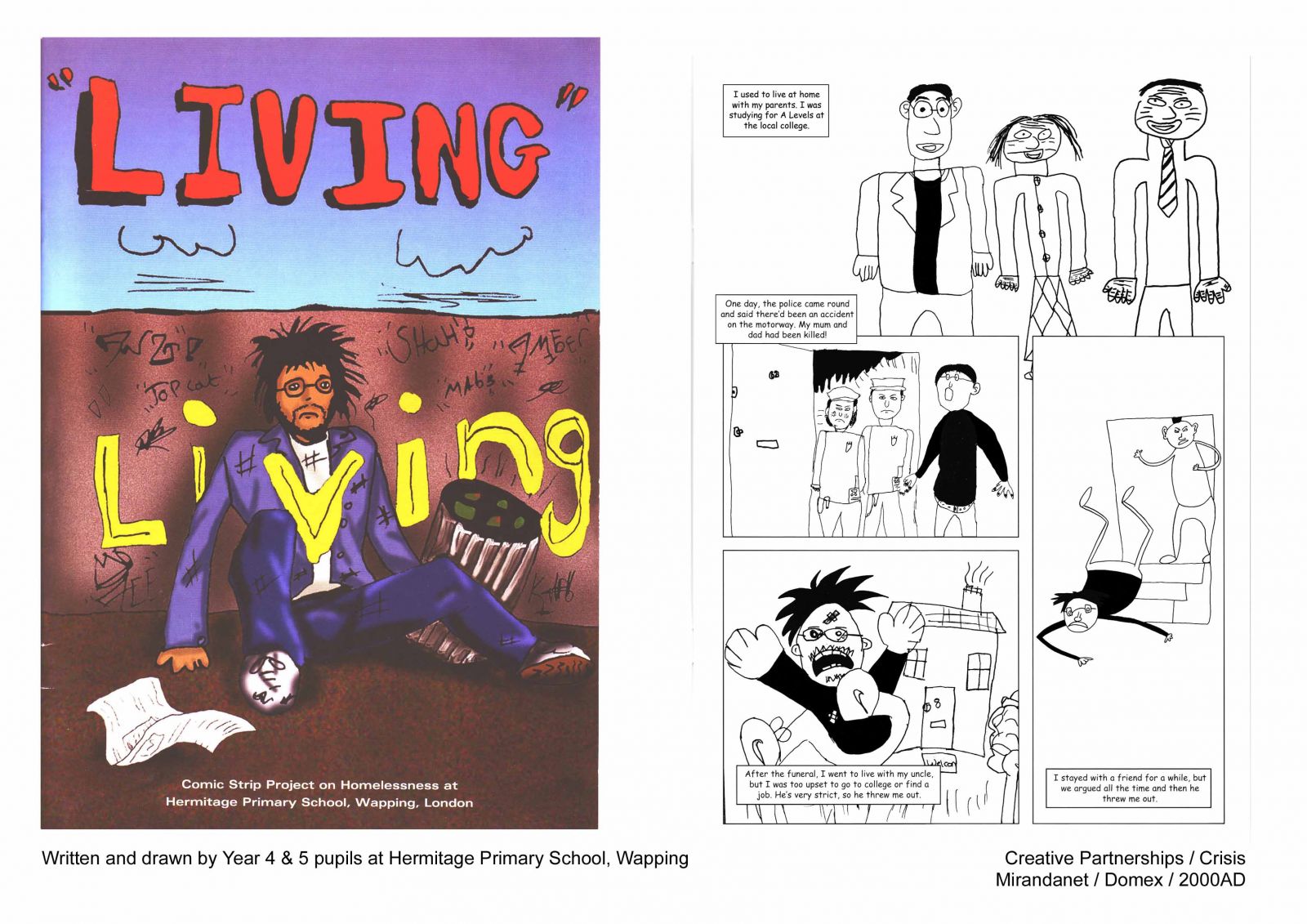
 Paul Solomons
Paul Solomons